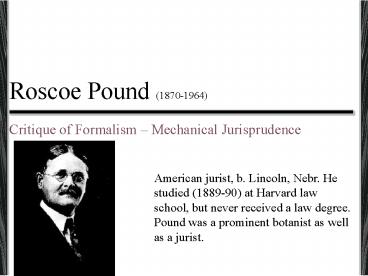Roscoe Pound 18701964 - PowerPoint PPT Presentation
1 / 6
Title: Roscoe Pound 18701964
1
Roscoe Pound (1870-1964)
- Critique of Formalism Mechanical Jurisprudence
American jurist, b. Lincoln, Nebr. He studied
(1889-90) at Harvard law school, but never
received a law degree. Pound was a prominent
botanist as well as a jurist.
2
Pounds Thoughts on Legal Education
- ".......I should put as the content of a good
legal education - (1) A solid all round cultural training, with a
grasp of significant information which such a
training involves, but much more with the
broadening and deepening of experience and
ability to appraise information to which it
leads. - (2) A grasp at the ends and technique of the
social sciences this only, for beyond that,
what has been taught in their name has been
short-lived. - (3) A grasp of the history and a system of common
law, of the outline and ends of the legal order,
of the theory and ends of the judicial and
administrative processes, and of the history,
organization, and standards of the legal
profession. - (4) A thorough grasp of the organization and
content of the authoritative legal materials of
the time and place and of the technique of
developing and applying them. - If one has these, he has whereon he can build to
the exigencies of the many demands of different
types of professional activity and of the public
need of enlightened judges and wise lawmakers, of
law reformers and law teachers, and of legal
scholars." - From an address to the American Bar Association
in 1933.
3
Full, equal, and exact justice.
- Scientific law demands
- Full justice solutions that solve the root
controversy - Equal justice like adjustment of like relations
under like conditions - Exact justice legal operations which, within
reason, are predictable - Scientific law, then, is a reasoned body of
principles for the administration of justice, and
its antithesis is a system of enforcing
magisterial caprice, however honest, and however
much disguised under the name of justice or
equity or natural law. - Law should be scientific in order to
- Eliminate the personal equation in judicial
administration - Preclude corruption,
- Limit the dangers of magisterial ignorance
- Law is not scientific for the sake of science,
but as a means to an end and the results it
achieves. - Beware of systems, as it is in the nature of
rules to operate mechanically without regard to
current ideas of fair play.
4
Science in Law
- We reject scientific as meaning a system of
deductions from a priori conceptions. The idea
of science as a system of deductions is obsolete. - Theories are instruments, not answers to enigmas.
We require them to exhibit practical utility,
and rest them upon a foundation of policy and
established adaptation to human needs. - The sociological movement is a movement for
pragmatism as a philosophy of law in place of
assumed first principles the human factor has
first place, while logic is but an instrument. - Law as science is a dangerous game as
pseudo-sciences may lead to monstrous legal
rules. Law is not scientific in the hard or
empirical science sense, but only in the soft
or social sciences sense. GWR
5
The Sociological School of Jurisprudence
(Reformers)
- Instead of seeking for an ideal universal law by
metaphysical methods, the ideal of all schools is
to turn the community of fact of mankind into a
community of law in accord with the reasonable
ordering of active life. Hence they hold that
the less arbitrary the character of a rule and
the more clearly it conforms to the nature of
things, the more nearly does it approach to the
norm of a perfect law. - Principles, not rules, should be the basis of
judicial decision. The true way is to make rules
fit cases instead of making cases fit rules. - His classic example is the rules of procedure,
which he deems to be one in which mechanical
(scientific) procedure becomes and end of itself,
delaying or defeating substantive law and justice
instead of being a mechanism for speeding and
enforcing substantive justice. - The life of the law is in its enforcement.
6
The Task of Judging
- The nadir of mechanical jurisprudence is reached
when conceptions are used, not as premises from
which to reason, but as ultimate solutions. - Law is the art of knowing what is good and just.
Anyone may properly call us the priests of this
art, for we cultivate justice and profess to know
what is good and equitable, dividing right from
wrong, and distinguishing what is lawful from
what is unlawful desiring to make men good
through fear of punishment, but also by the
encouragement of reward aiming, if I am not
mistaken, at a true and not a pretended
philosophy. - The task of a judge is to make a principle
living, not by deducing from it rules to last
forever, but by achieving thoroughly the less
ambitious but more useful labor of giving a fresh
illustration of the intelligent application of
the principle to a concrete cause, producing a
workable and a just result. The real genius of
our common law is in this, not in an eternal
case-law.





























![Read [PDF] Roscoe 'Fatty' Arbuckle: A Biography of the Silen PowerPoint PPT Presentation](https://s3.amazonaws.com/images.powershow.com/10091836.th0.jpg?_=202408030110)
![Download Book [PDF] The Price for Their Pound of Flesh: The Value of the Enslaved, from Womb to PDF PowerPoint PPT Presentation](https://s3.amazonaws.com/images.powershow.com/10122329.th0.jpg?_=202409061112)
